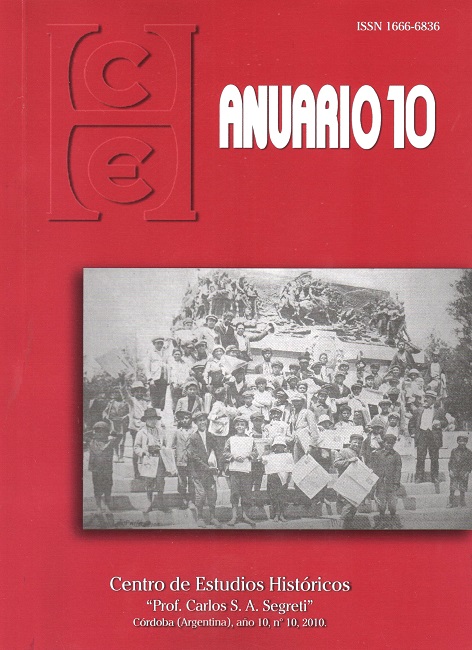The social role of an economic contract. Notarized credit and relational resources in Buenos Aires, at the beginnings of the XVII century.
DOI:
https://doi.org/10.52885/2683-9164.v0.n10.23145Keywords:
credit, networks, contracts, 17th centuryAbstract
By the first half of the seventeenth century, Buenos Aires was experiencing the process of its local social integration and was joining into the various commercial circuits, which transformed its economic life. It was deeply studied the way in which social networks, built on trust and loyalty, offered an organizational framework to businesses within the local elite in this marginal (and central at one time) port in the Hispanic American Old Regime. Therefore, the presence of notarized credit contracts represents a problem to investigate. Which was the role and significance of this formal mechanism into such a network context? We try to get an answer to this question by contrasting the relationships of formal credit with ritual kinship ties, through the trajectory built by one of the major creditors.
Downloads
References
BERTRAND Michel, “Los modos relacionales de las élites hispanoamericanas coloniales: enfoques y posturas”, Anuario IEHS, vol 15, 2006.
FERREIRO Juan Pablo, “Aproximación analítico-estructural a los habitus nupciales, parentales y políticos de Jujuy durante el siglo XVII”, Surandino Monográfico, segunda sección del ProHAL Monográfico, vol. 1, núm. 2, 2010.
GELMAN Jorge, “Economía natural - Economía monetaria. Los grupos dirigentes de Buenos Aires a principios del siglo XVII”, Anuario de Estudios Americanos, vol. XLIV, 1987.
GELMAN Jorge (coord.), La historia económica argentina en la encrucijada. Balances y perspectivas, Buenos Aires, Prometeo, 2006.
GONZÁLEZ LEBRERO Rodolfo, La pequeña aldea. Sociedad y economía en Buenos Aires (1580-1640), Buenos Aires, Biblos, 2002.
HERZOG Tamar, Mediación, archivos y ejercicio. Los escribanos de Quito (siglo XVII), Frankfurt, Vittorio Klostermann Frankfurt am Main, 1996.
MINTZ Sidney W. y WOLF Eric R., “An Analysis of Ritual Co-Parenthood (Compadrazgo)”, Southwestern Journal of Anthropology, vol. 6, núm. 4, 1950.
MOUTOUKIAS Zacarías, Contrabando y control colonial en el siglo XVII. Buenos Aires, el Atlántico y el espacio peruano, Buenos Aires, CEAL, 1988.
SAGUIER Eduardo, “Economic impact of comercial capital on credit transactions: Buenos Aires in the early seventeenth century”, Anuario de Estudios Americanos, Sevilla, vol. XLIV, 1987.
SCHEUSS DE STUDER Elena, La trata de negros en el Río de la Plata durante el siglo XVIII, Buenos Aires, Universidad de Buenos Aires, 1958.
TRUJILLO Oscar, “Facciones, parentesco y poder: La élite de Buenos Aires y la rebelión de Portugal de 1640”, YUN CASALILLA Bartolomé (coord.), Las redes del imperio: élites sociales en la articulación de la monarquía hispánica, 1492-1714, Universidad Pablo de Olavide, Marcial Pons, 2009.
VALLADARES RAMÍREZ Rafael, “El Brasil y las Indias españolas durante la sublevación de Portugal (1640-1688)”, Cuadernos de Historia Moderna, vol. 14, 1993.
Downloads
Published
How to Cite
Issue
Section
License
Aquellos autores/as que tengan publicaciones con esta revista, aceptan los términos siguientes:
- Los autores/as conservarán sus derechos de autor y garantizarán a la revista el derecho de primera publicación de su obra, el cuál estará simultáneamente sujeto a una Licencia de reconocimiento de Creative Commons. Se puede compartir, copiar, distribuir, ejecutar y comunicar públicamente la obra, siempre que: a) se cite la autoría y la fuente original de su publicación (revista, editorial y URL de la obra); b) no se use para fines comerciales; c) no se altere, transforme o genere una obra derivada a partir de esta obra.
- Los autores/as podrán adoptar otros acuerdos de licencia no exclusiva de distribución de la versión de la obra publicada (p. ej.: depositarla en un archivo telemático institucional o publicarla en un volumen monográfico) siempre que se indique la publicación inicial en esta revista.
- Se permite y recomienda a los autores/as difundir su obra a través de Internet (p. ej.: en archivos telemáticos institucionales o en su página web) después del proceso de publicación, lo cual puede producir intercambios interesantes y aumentar las citas de la obra publicada. (Véase El efecto del acceso abierto).


